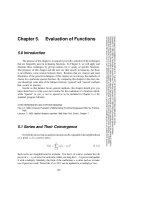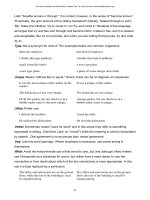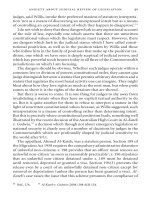The Future Governance of Citizenship Part 1 docx
Bạn đang xem bản rút gọn của tài liệu. Xem và tải ngay bản đầy đủ của tài liệu tại đây (154.26 KB, 21 trang )
This page intentionally left blank
The Future Governance of Citizenship
In much of the citizenship literature it is often considered, if not simply
assumed, that citizenship is integral to the character of a self-determining
community and that this process, by definition, involves the exclusion of
resident ‘foreigners’. Dora Kostakopoulou calls this assumption into question,
arguing that ‘aliens’ are by definition outside the bounds of the community by
virtue of a circular reasoning which takes for granted the existence of bounded
national communities, and that this process of collective self-definition is
deeply political and historically dated. Although national citizenship has
enjoyed a privileged position in both theory and practice, its remarkable
elasticity has reach ed its limit, thereby making it more important to find an
alternative model. Kostakopoulou develops a new institutional framework for
anational citizenship, which can be grafted onto the existing state system,
defends it against objections and proposes institutional reform based on an
innovative approach to citizenship.
Dora Kostakopoulou is Jean Monnet Professor in European Law and Integration
at the School of Law, University of Manchester.
The Law in Context Series
Editors: William Twining (University College London),
Christopher McCrudden (Lincoln College, Oxford) and
Bronwen Morgan (University of Bristol)
Since 1 970 the Law in Context series has been in the forefront of the movement to broaden
the study of law. It has been a vehicle for t he pu blicati on of innovative scholarly books that
treat law and legal phenomena critically in their social, political and economic contexts
from a variety of perspectives. The series particularly aims to publish schol arly legal writin g
that brings fre sh perspectives to bear on new and existing areas of law taught in universities.
A contextual approach involves treating legal subjects broadly, using materials from other
social sciences, and fr om any other discipline that helps t o explain the operation in practice
of the subject under discussion. It i s hoped that this orientation is at once m ore stimulating
and more realistic than the bare e xposition of legal rules. The series i ncludes original books
that have a different emphasis from traditional legal textbooks, while maintaining the same
high standards of scholarship. They are written primarily for undergraduate and graduate
students of law and of other disciplines, b ut most also appeal to a w ider readership. I n the
past, most b ooks in the series h ave f ocused on Engl ish l aw, but re cent publicati ons include
books on European law, globalisation, transnational legal processes, and comparative law.
Books in the Series
Anderson, Schum & Twining: Analysis of Evidence
Ashworth: Sentencing and Criminal Justice
Barton & Douglas: Law and Parenthood
Beecher-Monas: Evaluating Scientific Evidence: An Interdisciplinary Framework for
Intellectual Due Process
Bell: French Legal Cultures
Bercusson: European Labour Law
Birkinshaw: European Public Law
Birkinshaw: Freedom of Information: The Law, the Practice and the Ideal
Cane: Atiyah’s Accidents, Compensation and the Law
Clarke & Kohler: Property Law: Commentary and Materials
Collins: The Law of Contract
Cranston: Legal Foundations of the Welfare State
Davies: Perspectives on Labour Law
Dembour: Who Believes in Human Rights?: The European Convention in Question
de Sousa Santos: Toward a New Legal Common Sense
Diduck: Law’s Families
Elworthy & Holder: Environmental Protection: Text and Materials
Fortin: Children’s Rights and the Developing Law
Glover-Thomas: Reconstructing Mental Health Law and Policy
Goldman: Globalisation and the Western Legal Tradition: Recurring Patterns of Law and
Authority
Gobert & Punch: Rethinking Corporate Crime
Harlow & Rawlings: Law and Administration
Harris: An Introduction to Law
Harris, Campbell & Halson: Remedies in Contract and Tort
Harvey: Seeking Asylum in the UK: Problems and Prospects
Hervey & McHale: Health Law and the European Union
Holder and Lee: Environmental Protection, Law and Policy
Kostakopoulou: The Future Governance of Citizenship
Lacey & Wells: Reconstructing Criminal Law
Lewis: Choice and the Legal Order: Rising above Politics
Likosky: Transnational Legal Processes
Likosky: Law, Infrastructure and Human Rights
Maughan & Webb: Lawyering Skills and the Legal Process
McGlynn: Families and the European Union: Law, Politics and Pluralism
Moffat: Trusts Law: Text and Materials
Monti: EC Competition Law
Morgan & Yeung: An Introduction to Law and Regulation, Text and Materials
Norrie: Crime, Reason and History
O’Dair: Legal Ethics
Oliver: Common Values and the Public–Private Divide
Oliver & Drewry: The Law and Parliament
Picciotto: International Business Taxation
Reed: Internet Law: Text and Materials
Richardson: Law, Process and Custody
Roberts & Palmer: Dispute Processes: ADR and the Primary Forms of Decision-Making
Scott & Black: Cranston’s Consumers and the Law
Seneviratne: Ombudsmen: Public Services and Administrative Justice
Stapleton: Product Liability
Tamanaha: The Struggle for Law as a Means to an End
Turpin and Tomkins: British Government and the Constitution: Text and Materials
Twining: Globalisation and Legal Theory
Twining: Rethinking Evidence
Twining & Miers: How to Do Things with Rules
Ward: A Critical Introduction to European Law
Ward: Shakespeare and Legal Imagination
Zander: Cases and Materials on the English Legal System
Zander: The Law-Making Process
The Future Governance
of Citizenship
DORA KOSTAKOPOULOU
University of Manchester
CAMBRIDGE UNIVERSITY PRESS
Cambridge, New York, Melbourne, Madrid, Cape Town, Singapore, São Paulo
Cambridge University Press
The Edinburgh Building, Cambridge CB2 8RU, UK
First published in print format
ISBN-13 978-0-521-87799-2
ISBN-13 978-0-521-70178-5
ISBN-13 978-0-511-39697-7
© Dora Kostakopoulou 2008
2008
Information on this title: www.cambridge.org/9780521877992
This publication is in copyright. Subject to statutory exception and to the provision of
relevant collective licensing agreements, no reproduction of any part may take place
without the written
p
ermission of Cambrid
g
e University Press.
Cambridge University Press has no responsibility for the persistence or accuracy of urls
for external or third-party internet websites referred to in this publication, and does not
g
uarantee that any content on such websites is, or will remain, accurate or a
pp
ro
p
riate.
Published in the United States of America by Cambridge University Press, New York
www.cambridge.org
paperback
eBook (NetLibrary)
hardback
Contents
Acknowledgements page viii
Introduction
1
1 The cartography of citizenship 12
2 The nationality model of citizenship and its Critics 45
3 Shades of togetherness, patriotism and naturalisation 66
4 The institutional design of anational citizenship 100
5 Anational citizenship in the international public realm 127
6 The variable geometry of citizenship 143
7 Pathways to inclusion 172
Conclusion 196
Bibliography 202
Index 220
settled, very few individuals would actually call into question the value and
importance of citizenship.
3
Given the prominence of citizenship in public discours e and academic liter-
ature, it is tempting to think that we know almost everything about it. However,
when we turn our attention to contemporary challenges, such as pressures for
regional autonomy, global economic processes and global inequalities, climate
change, i ncreased hu man mobility a nd the claims made b y resident non-nationals
for poli tical inclusion, cultural plu ralism, continuing discrimination a nd interna-
tional terrorism, we gradually discover not only that we know less than we
thought, but we are also confronted with citizenship’s limitations. Frustrating
this may be, it is, nevertheless, understandable. It is not easy to reconcile twenty-
first-century challen ges a nd pro b lems w i th twentieth-century resources an d
nineteenth-century models. The nation-state may be under pressure from
above, below and within – that is, the pace of social and economic change,
migratory movements, demands for regional autonomy, claims for full citizen-
ship from marginalised citizens and non-citizen residents, the internalisation of
the economy and accelerated capital mobility, the development of supranational
law and institutions and, lately, the intransigence of dogmatism – but the
nationality model of citizenship continues to be the dominant paradigm.
Having a historical pedigree of approximately 200 years, national citizenship
reflects the relati onship between right-bearing individuals and the territorial
state, which has been conceived of as the political embodiment of a nation, that
is, as an association of compatriots endowed with sovereignty. According to
this paradigm, free and equal citizens qua nationals are united by a shared set
of values and patriotic allegiance in a quest for democratic governance. Four
main assumptions have traditionally underpinned national citizenship: I will
call them the priority, exclusivity, supremacy and cohesion theses. According
to the priority thesis, citizens must show a preference for the well-being of their
fellow co-nationals over that of non-nationals residing both within and outs ide
the territorial borders. The idea of having special obli gations to the members of
one’s community (Miller 1995) stems from the ‘we feeling of the nation’ and
the concomitant sense of shared identity. Although citizens live among strang-
ers who they will never know (Anderson 1983), they have been accustomed to
think of them as compatriots. Accordingly, their interests matter more than the
interests of non-compatriots, irrespective of the latter’s residential proximity.
The exclusivity and sup remacy theses refer to the assumptions that national
identification should be single – it should not reflect multiple belongings,
4
and should subdue, absorb and assimilate all other individual or collective
3
Turner (1993) has argued that citizenship is a key aspect of our political thinking.
4
The ideal of monopatride citizen has been the hallmark of national citizenship. Accordingly,
multiple nationality has been seen to be both undesirable and a problem, since it results in
divided loyalties. For an excellent account of the implications of this, see Leuprecht (2001).
2 The Future Governance of Citizenship
identifications, respectively.
5
Citizens have thus been expected to display
absolute and unconditional allegiance to their nation. Finally, the internal
cohesion thesis refers to the assumption that heterogeneity and pluralism are
not conducive to political stability and democratic governance. As Mill (Mill
1972 [1861] 382) noted: ‘free institutions are next to impossible in a country
made up of different nationalities. Among a people without fellow-feeling,
especially if they read and speak different languages, the united public opinion,
necessary to the working of representative government, cannot exist.’ The
paradox, here, is that while difference has been perceived to be a problem
and a barrier, national citizenship itself has been founded on, and sustained
through, difference, that is, the insider/outsider distinction. By excluding the
outsider, it has managed to elicit the loyalty of the citizenry. Bec ause all these
assumptions, which will receive more detailed attention below, reflect the
world of yesterday, rather than contemporary realities, their grip upon think-
ing, policy and politics has been noticeably weakened over the last two decades.
Indeed, the political landscape has shifted in such a way that the nationality
model of citizenship has been seen to be an anachronistic institution by both
globalists and sociologists keen to explore the dynamics associated with the
language of human rights (Soysal 1994; Jacobson 1996) or the recovery of the
‘subject’ (Touraine 2000). Others disagree. They pref er to bracket the limita-
tions of citizenship qua national membershi p, and proceed to address sub-
stantive issues, such as enhan cing participation and equality. This trend thus
centres on what may be called a ‘limitation neglect’; that is, community
membership and boundaries are taken as given and unproblematic. Finally, a
third trend in the literature on citizenship starts from a different premise;
namely, scholars acknowledge the limitations of national citizenship, but they
seek to remedy them and to increase the inclusionary side of citizenship by
reforming national citizenship and by pluralising national cultures and iden-
tities. Although scholars have chronicled the crisis of the nationality model of
citizenship well in the light of the prevailing notions of democratic legitimacy,
the forces of globalisation and the unfolding dynamics of European integra-
tion, the search for a truly non-national alternative has not progressed.
This book seeks to furnish the tools required in order to transcend the
present limitations of citizenship and make it more meaningful in the twenty-
first century. It does so by suggesting an alternative citizenship design based on
domicile and defending it against a number of objections. Although the history
of the nation-state weighs heavily on citizenship, we should not forget that the
latter has been characterised by remarkable plasticity. As society develops over
time and its central themes and guiding values are undergoing revision and
refinement, citizenship is re-written in a way that transcends the narrow confines
of the past, while retaining its capacity to be meaningful and socially relevant.
5
According to Smith (1979) the idea that loyalty to the nation-state overrides other loyalties is
one of the seven propositions that make up the core nationalist doctrine.
3 Introduction
This is often done by enhancing rights protection, increasing civic involvement
and by promoting democratic inclusion and equality in the political system.
And although one should always be sensitive to constraints and political
obstacles, we also should keep in mind that citizenship is, perhaps, the only
institution that has the capacity to turn strangers into fellows and residents
into associates in an ongoing quest for just and democratic institutions and for
improved symbiosis. But now that the scope of this book has been sketched out
and the importance of citizenship highlighted, readers might wonder why we
should address citizenship now.
Why citizenship now? Turning points and transition theories
In the 1990s, political reform in Eastern Europe brought about an unprece-
dented optimism about the future and a widespread belief that politics can
change things for the better provided that the liberty of the citizens is respected.
6
And citizens can only be free if they view themselves to be not only the addressees
of laws promulgated by governments, but also the joint authors of such laws. At
the same time, the processes of globalisation and European integration provided
another, equally gripping, motivation for engagement with fundamental think-
ing about community membership and the role of the citizen. The establishment
of European Union citizenship, by the Treaty on European Union in 1992,
brought forth the possibility of disentangling citizenship and nationality and,
despite its present limitations, this institution was legitimately considered to be a
prototype for political experimentation beyond the confines of the national
state.
7
Such experimentation wa s seen to be n ecessary because the abovementioned
four theses underpinning the paradigm of n ational citizenship w ere revealed to be
both problematic and inappropriate for contemporary political communities.
This is because they were premised on assumptions about unitary identities,
unified nation-states, homogenous political cultures and clear boundaries
between members and strangers which did not reflect reality (Kymlika and
Norman 2000). Democracy and nationalism may have been bedfellows for a
very long time, but, in the last two decades of the twentieth century, their uneasy
relationship could no longer be concealed. Activists and scholars argued con-
vincingly that the fixity, assumed homogeneity and simplicity of the old para-
digm perpetuated exclusion and separation, left many inequalities unscathed,
subjugated competing religious beliefs and cultural frames of meaning, encour-
aged isolationist minority positions, hindered social capital formation and dem-
ocratic partnerships.
The parallel trends of internal differentiation and cultural globalisation,
coupled with European integration and processes of decentralisation, gradually
6
Compare J. Dunn (2005).
7
This will receive a detailed exposition in Chapter 1.
4 The Future Governance of Citizenship
induced transformations of national identities in Europe and elsewhere. In the
UK, for example, Parekh (2000) articulated possible options for the redefini-
tion of national identity, and his report on the future of multi-ethnic Britain
outlined a set of institutional reforms which could make Britain a more vibrant
multi-ethnic society. As the national was squeezed among assertive pluralism,
on the one hand, and transnational and supranational forces, on the other,
scholars wondered whether the modern nationality model of citizenship had
outlived its usefulness. For although these developments did not precipitate
the eclipse of the nation-state, they nevertheless demonstrated that the gen-
erative matrix from which citizenship had sprung was based on the manufac-
tured couplings and equivalences between the state, the nation, sovereignty,
territoriality, democracy and citizenship that were not as tight as it was
previously thought. The loosening of the connections and the possibility for
new combinations was heralded to be a unique opportunity to remedy the
exclusiveness, restriction and discrimination that prevailed in the past, to
straddle the opposition between citizenship theory and po litical reality that
had widened by the conservatism of the 1980s, and to promote social justice.
In the early twenty-first century, however, people found that political life
was neither caring nor compassionate. Human life was not worth much:
bombers did not care about where they bombed, soldiers did not care about
who they killed and politicians pursued their own narrow agenda without
much regard for international legal guarantees and human rights. In the
aftermath of the catastrophic events of 11 September 2001 security concerns
prevailed and authoritarianism dominated the political agenda on both sides
of the Atlantic. Politicians argued that changes in citizenship, naturalisation
and migration policies were appropriate, and indeed inevitable, in light of new
and unprecedented security threats posed by Al-Qae da and other terrorist
groups. Accordingly, they pursued policies designed to strengthen national
cohesion by increasing naturalisation requirements, stripping dual nationals of
their nationality, and to restrict civil liberties, such as detention without trial,
control orders, restrictions on free speech, increased powers of arrest and so
on. One thus notices a clear shift away from mu lticulturalism and diversity
towards either ‘integration’ or ‘assimilation’ and a gradual ‘thickening’ of
notions of political belonging in western Europe and elsewhere. The loyalty
of Muslim citizens and residents has been called into question by the main-
stream parties, while the Populist Right pursues its Islamophobic and anti-
migrant discourse with a renewed dynamism, capitalising upon the threat of
terrorism.
Although the political struggle to make citizenship more meaningful con-
tinues in the form of policy battles over border regulation and migration
policy, loyalty and patriotism, naturalisation rules and dual citizenship, anti-
discrimination legislation and social welfare reform, in the current state of
affairs nationalism appears to be a right without a left. It is as if political
options have run out. Opinion polls reveal that millions of people have lost
5 Introduction
hope in politics, are distrustful of politicians and cynical about the future.
8
Clearly, this is a turning point as regards citizenship. And turning po ints do not
merely provide good illustrations about unfolding social processes and the role
of time in politics (Pierson 2004), they also prompt a critical reflection on what
works and what needs to be fixed, a consideration of a different vision and the
transition from one set of beliefs to another. Turning points are thus closely
linked with transition theories.
True, no transition theory can predict with certainty the future of the
nationality model of citizenship. Nor is it easy to ascertain whether the trend
of making the ethnic boundaries of citizenship more visible will take hold and,
more generally speaking, where we are headed in terms of reconfigurations of
citizenship. But given the risks posed by the thickening of national identities
and state authoritarianism, it is not only reasonable to ask what modifications
and adjustments citizenship needs, but it is also vital that we defend the
normative ideals of inclusive and democratic citizenship in the twenty-first
century. We thus need to reignite a vision that points towards the future while
taking stock of the past. We also need to debate openly alternative institutional
designs that might improve democratic life by providing better connections
among the whole and the parts, democracy and diversity, and supranational
patterns of governance and democratic partnerships both within and beyond
the state. In other words, we need to ponder upon embedded utopianism.
Embedded utopianism
In many respects, the nation-state centred notion of citizenship has not only
prevented us from developing a sophisticated understanding of associational
relations and from articulating an appropriate response to present challenges,
but it has also stifled normative thinking by insisting that polities are like clubs.
As such, they have the power to exclude eligible applicants from admission to
the public realm of the community. Longstanding residents are, according to
Cole (2000), ‘outsiders’, since they are permitted to enter the private realm of
the state, but are excluded from the public realm. In the subsequent discussion,
I argue that the analogy between a polity and a club is incorrect and that
another configuration of citizenship is possible which reflects more accurately
present historical exigencies and, more importantly, democratic sensibilities.
For as Bauman (2001, pp. 54–5) has convincingly argued:
democracy is not an institution, but essentially an anti-institutional force, a
‘rupture’ in the otherwise relentless trend of powers-that-be to arrest change, to
silence and to eliminate from the political process all those who have not been
‘born’ into power Democracy expresses itself in a continuous and relentless
critique of institutions; democracy is an anarchic, disruptive element inside the
8
See, for example, the poll conducted by The Sunday Times on 31 December 2006.
6 The Future Governance of Citizenship
political element; essentially, a force for dissent and change. One can best recognise
a democratic society by its constant complaints that it is not democratic enough.
Sharing this critical sensibility and believing that democracy cannot be imag-
ined without internal inclusion, in this book I seek to think the impossible with
respect to citizenship while being attentive to what exists and the forces that
have shaped its historical evolution. By looking into the horizon of ‘what
could be’ or ‘what might be’, I avail myself of a language of critique and social
transformation
9
– a language of embedded utopianism.
Underlying this term is an awareness of the need to keep the normative
agenda on a realist footing. Alas, it is not sufficient to come up with alternative
institutional designs and to assume that they will be adopted by policy-makers
who are convinced about their strengths. We also need to analyse the obstacles
that stand in their way, consider possible objections to them and reflect on the
political forces that may work against their implementation. Although
throughout the subsequent discussion I seek to anticipate objections to my
argument and to address a number of criticisms that may be raised from
differing political perspectives and theoretica l traditions, it may be worth
pre-empting, and responding to, a few general criticisms at this point.
Three general, albeit interrelated, criticisms may be anticipated. The first is
raised in almost all cases involving institutional transformation and bears a
close resemblance to A.O. Hirschman’s (1991) futility thesis; namely, that
attempts at social transformation will simply fail to make a ‘dent’. Politics is,
after all, the art of the possible. In assessing the chances of implementing
institutional reforms in ‘the real world’, however, one must bear in mind
that the line separating ‘possibility’ and ‘impossibility’ is quite indistinct.
Things widely held to be impossible in the past have been, in fact, entirely
possible. In addition, our conception (and prediction) of what is possible and
impossible is self-limiting (Barrow 1999): the possible and its limits are
essentially defined by our perspectives and institutionalised political choices.
And even though we long for certitude and predic tability, on a deeper level we
know that the world, be it cosmic or political, is complex, unruly and unpre-
dictable. In this respect, questions of feasibility must be situated within the
matrix of fluid, dynamic, constantly changing political and institutional envi-
ronments. In such environments, not only is there no privileged vantage point
from which one may pass judgement on what can and cannot be achieved, but,
like balloons, whose shape and volume cannot be detected before inflating
them, even small mutations can have big and often unexpected effects.
Secondly, it may be argued that the transformation costs associated w ith an
alternative model of citizenship are simply too high. I take ‘transformation
costs’ to include not only the resources devoted to the process of considering a
9
From this standpoint, the scholars’ task is not merely to promote understanding and identify
gaps in knowledge. They also have a responsibility to intervene, criticise injustice, ask
uncomfortable questions and suggest alternatives. On this, see Brown (2001).
7 Introduction
rule change (Buchanan and Tullock 1962) but also the expected, ex post
impact of the proposed rule change on other institutions and the political
setting in general. After all, an anational citizenship desig n will not only
radically transform citizenship, but will also shake the foundations of modern
politics by decentring the national frame of reference. For some, this would be
an unacceptable cost. But equally, for others, the continued con ditioning of
citizenship by nationality in the present globalised era entails a number of
unacceptable costs and constraints. Some might even go further and argue that
it ultimately discredits itself by its indifference to principle. Upholding the
principle of democratic inclusion and placing political membership on a more
egalitarian plateau in the new millennium may thus require a critical appraisal
of ideologically driven justifications and a willingness to explore new ways of
articulating the alliance between citizenship and democracy. After all, as
Hirshman’s discussion of the jeopa rdy thesis has shown, it is often the case
that fears about these pressures and transformation costs are greatly over-
blown. Furthermore, unsettling particular meanings and thinking beyond the
given are central to democratic transformation.
Thirdly, it may be argued that my framework does not take into account the
wishes, perceptions and preferences of the average voter. Indeed, in the current
climate of suspicion and negativity that has accompanied the ‘war on terror’,
the enactment of an inclusionary framework of anational citizenship is bound
to generate hostile reactions from the public. I see two problems with this
argument. First, it is bedevilled by a ‘chicken-and-egg’ question. For instance,
if people are suspic ious of ‘foreigners’ and tend to trust co-nationals more, it is
not clear whether nationality produces these sentiments and reactions or
whether these are the by-product of nationalist discourses and appeals to
ethnic exclusiveness espoused by politicians, of anti-migrant rhetoric and of
hostile representations of migrants by the media. After all, a cursory look at the
state of political affairs since 9/11 shows that it is not so much the average
voter, but politicians and the media, who are controlling the debate and the
prevalent discourse on migration, citizenship and nationality. In many
respects, ‘the nation’ is not discovered and expressed by the government of
the day; instead, it is made and remade by it.
Secondly, although one cannot afford to disregard what people may want,
over time political life w ould become impoverished if peoples’ preferences
(and often prejudices) were made the bas is for citizenship design. After all,
political judgements about what the national interest requires and the best way
to deliver public goods do not always coincide with public preferences. Nor has
such an argument concerning ‘telling people what they want to hear’ or
‘delivering what people want’ been relevant with respect to a great deal of
public policies and government-driven radical reforms, such as the denation-
alisation of public utilities, private fina nce initiatives, taxation and so on.
Alas, the above arguments may not convince critics. Readers may disagree
with my responses and, by the end of the journey, may even conclude that
8 The Future Governance of Citizenship
I may not have offered an acceptable solution to the problems pertaining to
national citizenship. Such a response would not be regrettable. The book
would, indeed, have been devoid of purpose if all readers agreed with me. It
seems to me that a valuable purpose will be served if the discussion provokes
debate, encourages a more reflective approach towards our paradigms and the
dominant nationality model of citizenship and stimulates thinking about
alternative institutional designs. Thinking differently about citizenship can
unlock many fruitful possi bilities, even if readers decide to depart from my
conclusion that the impossibility of anational citizenship is only in the mind.
In essence, what I am offering here is an invitation to start thinking about a
genuinely postnational framework of democratic citizenship and its institu-
tional implementation in the twenty-first century. In this respect, even if I am
judged to have failed in furnishing the correct – and in the opinion of certain
readers, an acceptable – imagining of citizenship for the future, I do hope that I
will at least succeed in the remaining objectives.
Plan of the book
The structure of the subsequent discussion reflects the themes of ideological
and structural change, theoretical inn ovation and institutional implementa-
tion. However, the book is not divided into parts. Nor has the discussion been
based on a separation between theory and praxis. Rather, theoretical and policy
perspectives are blended in an attempt to trace the rise and evolution of
citizenship, to account for the development of the nationality model of citizen-
ship, to explore its main ideological and practical limits, to furnish a solution
and to examine the empirical conditions for its implementation.
The discussion will proceed as follows. Chapter 1 traces the emergence and
development of citizenship. Following the exposition of different conceptual-
isations of citizenship, it discusses the dominant paradig m of national citizen-
ship and explores some of its main normative and empirical limitations.
Chapter 2 considers these limitations in more detail and critically assesses
liberal national justifications of the normative relevance of national identity
and culture. I argue that the latter are premised on a ‘container’ concept of
culture that may not be as sound as it first appears. I proceed to examine
whether an alternative conception of culture, that is, a conception of culture as
practice, process and project, represents a more promising way of thinking
about culture and the formation of political communities in this increasingly
interdependent and interconnected world.
Chapter 3 continues the discussion on the theme of ‘making a virtue out of
the necessity’ of nations and examines proposals to overcome the limitations of
the nationality model of citizenship by incorporating new ideas and reforming
naturalisation law and policy. More specifically, I critically examine two trends
in the literature; namely, the ‘new’ discourse of patriotism and new models of
citizenship. In examining contemporary discourses on patriotism, I argue that
9 Introduction
it is inconsistent and unpersuasive. Neither Viroli’s rooted patriotism (love of
patria understood as a community of shared political territory, historically
situated institutions and values grown out of historical processes) nor
Habermas’ constitutional patriotism (identification with the political culture
embodying universalist political principles) nor Mason’s republican patrio-
tism (love of central institutions and practices) succeed in transforming the
nationality model of citizenship in order to make it more compatible with
contemporary developments and with cultural pluralism. In all three accounts,
citizenship is embedded within the nation, and cannot function without the
thick, thin or thinner mutual sentiments of commonality and civic national
belonging. Patriotism in its various forms continues to have the nation-state as
a referent and presumes that citizenship is national in character. Similarly, the
three models of citizenship suggested by the literature – that is, postnational,
transnational and multicultural citizenship – remain rooted within the civic
nationalist trajectory. I demonstrate this by taking issue with the institution of
naturalisation. Owing to the weight of its past and the symbolic significance it
carries, even ‘thin’ naturalisation will con tinue to be rooted in and be con-
figured by ethnicity, thereby making any claim to inclusivity either spurious or
temporary. Instead of arguing for the liberalisation of naturalisation require-
ments and the ensuing pluralisation of citizenship, I consider how the nation-
ality model of citizenship might be transcended by developing a model of civic
registration.
Chapter 4 develops further the controversial option of superseding the
framework of nationality and dislodging citizenship from the confines of the
national. It sets forth arguments for redesigning citizenship by decentring
the national frame of reference from its privileged position in citizenship theory
and practice and by accentuating the network good character of citizenship. It
furnishes the guiding principles for an anational framework of citizenship,
shows how it can be implemented in reality and addresses a number of related
policy dilemmas and objections to it.
Chapter 5 develops this ana lysis by exploring the implications of the ana-
tional model of citizenship in the international public realm and, more spe cif-
ically, in the fields of diplomatic protection, the nationality of claims, plural
citizenship and double punishment. I argue that a model of citizenship based
on domicile would substitute nationality in the international domain, since it
is premised on the existence of a genuine and effective connection between the
individual and a political community. Such connection would be brought to
an end in the event of voluntary renun ciation of domicile of birth, domicile of
choice, domicile of association and the revocation of civic registration owing
to fraud or misrepresentation. Prolonged domicile abroad would also result in
the severance of the links between the citizen and the country in which (s)he
has domicile of choice.
Having designed the personal scope of denationalised citizenship, Chapter 6
focuses on examining its material scope. A central question in such an enquiry
10 The Future Governance of Citizenship
is how much weight should be given to the notion of differentiated citizenship.
The idea of differentiated citizenship has emerged as a response to the critique
of liberal citizenship in the 1990s. Accordingly, differentiated rights and asym-
metrical solutions ar e seen as an effective means of tackling inequality and
empowering discriminated against groups. I critically examine the relevant
literature and argue that, although accounts of differentiated citizenship are
both insightful and important, differentiated citizenship is not a novel idea.
Citizenship has always been differentiated and liberal citizenship constitutes
no exception. I examine three faces of differentiation built into citizenship to
illustrate my point and argue that the citizenship debate must go beyond the
equal citizenship status and differentiated citizenship dualism by focusing on
the development of an institutional framework of flexibility that promotes
equality, inclusive democratic politics and fairer terms of group incorporation.
Put another way, any credible model of citizenship has to exhibit what may be
termed ‘a variable geometry’. I then proceed to furnish the specifics of the
variable geometry design.
In Chapter 7 I graft flesh onto the variable geometry model by linking the
normative template with issues of public policy and service delivery. Guided by
the theoretical framework of anational citizenship, I focus on institutional
frameworks for minority incorporation and proposals for policy reform. In
this respect, I examine various modes for the incorporation of minority groups
in various countries, and argue that ‘living together’ in a radically plural and
increasingly interdependent world might require the replacement of the
vocabulary of integration with that of participation in practices of socio-
political co-operation. I furnish the necessary ingredients of such a pluralistic
mode of inclusion and explore what needs to be done in order to remove
barriers to socio-political inclusion, equal participation and respectful recog-
nition, by identifying a number of what I call ‘vertical’ and ‘horizontal’ path-
ways for minority inclusion.
Finally, Chapter 8 summarises my arguments and urges that we overcome
political obstacles that will prevent institutional reforms from being enacted
and ideas from taking root. After all, one must have faith that change is
possible and that good ideas can capture the political imagination. But change
is unlikely to occur unless the what, when and why of national citizenship and
its alternatives are openly discussed and questions so far avoided are raised. I
sincerely hope that this book will serve as a channel for such questioning and
re-imagining.
11 Introduction
variability. These could be either some core ideas, such as the notion of equal
membership in a political community, however narrowly or broadly the latter
may be defined, or an array of complex interrelationships among free and
equal citizens on a horizontal level and between citizens and the polity on a
vertical level. Indeed, citizenship has emerged from such ‘connections’. More
importantly, as we shall see below in connection with the project of European
integration, these are still at the mercy of complicated processes and hi storical
events that produce often unexpected, dramatic changes and reconfigurations
of meaning.
1
Dissecting citizenship – that is, breaking it down into a few key components –
should by no means imply that citizenship can no longer be the site for
ideological and political battles, akin to those in the 1980s and 1990s. In the
1980s, the New Right resp onded to the Left’s emphasis on the primacy of social
and economic rights by successfully shifting the citizenship debate away from
entitlements to individual responsibility and by furnishing arguments for
states’ disengagement from welfare provision. The aim was to push individuals
into devising strategies of self-improvement and self-sufficiency. In the 1990s,
citizenship became a site of a major battle over a unified and uniform status
and national unity, on the one hand, and the recognition of group differences
and distinct cultural and collective rights which can be asserted against the
state, on the other. Finally, in the post-9/11 era, the rights versus security
dilemma has been predominant in policy and politics and we are witnessing a
renewed emphasis on (an idealised) national belonging, patriotic identifica-
tion and the integration of migrant and other minority groups in western
Europe and elsewhere.
Uncovering the constants of citize nship, however, may not be the only route
to understanding. For although such an exercise would enable us to appreciate
the importance and resilience of citizenship, it cannot capture fully the com-
plex history of citizenship and its divergent manifestations throughout the
world. Indeed, there exists such a multiplicity of meanings of citizenship in
history as well as between societies, that to aspire to a simple, unitary theory of
citizenship would be counterproductive. In this respect, it may be argued that
citizenship is what it is and does what it does, not because it contains certain
core elements, but because of the way in which its constituent parts are
organised, interwoven in various discourses and sedimented in institutions.
And if we fail to pay attention to the variability and indeterminacy of citizen-
ship, the forces that shape its evolution as a concept and an institution might
evade our consideration.
A danger here might be to see evolution of citizenship as a linear process;
that is, a progressive realisation of the core meanings that are definitionally
built into citizenship. This is something I shall try to avoid in considering the
1
As Mills (1959) has noted, standard categories of thought if applied to contemporary situations
become unwieldy, irrelevant not convincing.
13 The cartography of citizenship
past and the present of citizenship for three reasons. First, such a view would
sidestep the multiple and highly differentiated forms of citizenship that have
existed in history (diachronically) and still exist across societies (synchroni-
cally). Secondly, it would have to focus on the dominant ensemble, thereby
excluding societal divisions and other ‘invisible’ citizenships, that is, the com-
plex, formal and informal citizenship practices that may take place below and
above the state. Finally, linearity, of any shape or form, leaves very little room
for silences and discontinuities between the ‘new’ and the ‘old’.
Having made these observations, I wish to draw attention in what follows to
the variability of citizenship and to present a critical genealogy of the complex
institutional and discursive means by which it has been configured. By so
doing, the discussion will lay the foundations for the more ambitious project of
redrawing citizenship along more inclusive and flexible lines to which the bulk
of this book is devoted. For citizenship has been (and is) an unfinished
institution. It has always combined a number of historically produced pre-
suppositions and processes of change, formations and transformations. As
such, it has been the subject of political contestation and periodic redefinition.
And, as we shall see below, whenever citizenship seemed to become increas-
ingly problematic owing to material changes, a multitude of processes and new
developments, it was not because it had reached a breaking point or because a
rival had emerged threatening a take over. Instead, it was due to a generalised
belief that some kind of reshuffling of meaning was need ed or that one of its
organising principles had outlived its purpose and cried out for replacement.
The origins of citizenship
Citizenship’s roots can be traced back to the ancient Greek city states. Within
the small, tightly knit communities of the ancient world, citizenship was
associated with participation in self-government. Aristotle defined the citizens
as ‘all those who share in the civic life of ruling and being ruled in turn’ (1948,
p. 1283). And Pericles’ infamous Epitaph, the funeral oration for those who fell
in the Peloponnesian War, emphasised further this definition: ‘we do not say
that a man who takes no interest in politics is a man who minds his own
business; we say that he has no business at all’ (Thucydides 1954, pp. 118–9). It
is true that, for Athenians, political participation was neither a mere supple-
ment to private life (the life as idiotis) nor a distracting state of affairs. Rather, it
was a normative pres upposition for the development of a good personality
(kalos kai agathos). Aristotle believed that the attainment of the highest good
required the adequate development of personhood, the possession of certain
attributes, such as wealth and health and, above all, civic participation.
Citizenship and participation in the koina, that is, in the public life of the
city-state, was so important, that if a man did not belong to the city, he was less
than what he could be. He lacked the full subjectivity of citizenship. As
Aristotle (1948) stated in Politics, ‘anyone who cannot form a community
14 The Future Governance of Citizenship









